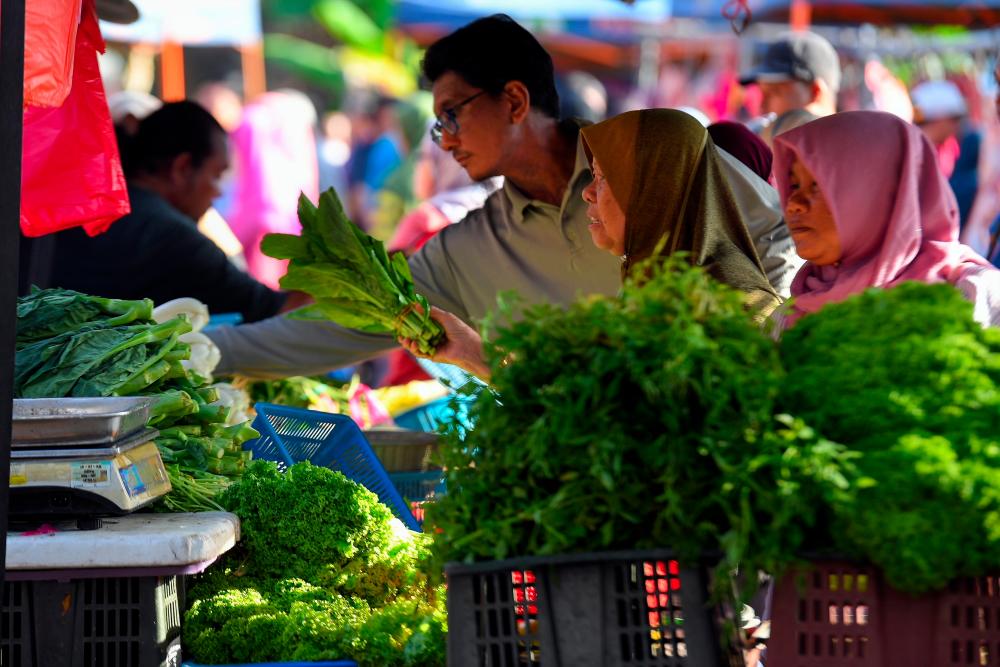RAMADAN is universally recognised for its significance in the Islamic calendar, bringing Muslims together in observance of fasting, prayer and acts of charity.
Central to the Ramadan experience is the breaking of the fast, or iftar, where families and friends gather to share meals and strengthen bonds of kinship.
However, recent years have seen a shift in how Malaysians approach iftar, with a growing trend towards eating out at restaurants or purchasing food from bazaars. While this may offer convenience and variety, it also comes at a cost.
Prices have been on the rise, driven by factors such as escalating costs of essential ingredients. Prices of staples such as rice, flour, cooking oil and vegetables have risen due to various factors, including inflation, changes in weather patterns affecting agricultural yields and disruptions in the supply chain.
For example, according to the Agriculture and Food Security Ministry’s latest market data, the national average price of Indian red onions is RM7/kg. This is almost double the baseline price of Indian red onions in 2022, which was RM3.90/kg. The situation has led to most traders increasing their prices for Ramadan bazaars this year, leading to backlash from the public as the costs of raw ingredients have been largely unchanged.
Furthermore, the implementation of the sales and service tax has led to increased costs for producers and consumers. This, in turn, has resulted in higher prices for goods and services, including food items. This puts a strain on household budgets, especially for those with limited financial resources.
Another factor contributing to food price inflation is the global market dynamics. Malaysia relies on imports for certain food products, and fluctuations in international commodity prices, exchange rates and geopolitical tensions impact the cost of imported goods.
For instance, changes in the price of crude oil, a key determinant of transport costs, affect the price of imported food items. In addition to external factors, domestic policies and regulations also influence food prices.
Government interventions such as subsidies and price controls aim to stabilise prices and ensure food affordability for consumers. However, the effectiveness of these measures may vary, and unintended consequences such as market distortions and inefficiencies arise.
The cumulative effect of these factors is felt by consumers, especially during periods of increased demand, such as Ramadan and Hari Raya.
The traditional iftar meal, with its emphasis on family dining together and festive feasting, puts additional strain on household budgets as individuals seek to procure ingredients for elaborate dishes and delicacies.
READ MORE:
State Assembly: Rising cost of living among causes of high divorce rate in Selangor
Makcik reminds PM over rising cost of living
The rising cost of food has implications beyond economic concerns, impacting food security, nutrition and overall well-being.
Amid the challenges posed by high food prices, home dining emerges as a viable and sustainable solution. By preparing meals at home, individuals and families can exercise greater control over ingredients, portion sizes and cooking methods, thereby promoting healthier eating habits.
Additionally, dining at home offers significant cost savings compared with eating out as homemade meals are generally more economical and can be tailored to suit dietary preferences and budgetary constraints.
To facilitate home dining during Ramadan, several strategies can be adopted such as meal planning. Meals can be planned ahead of time, and setting a budget for groceries can prevent impulse purchases and ensure that ingredients are used efficiently.
On the contrary, busy working adults may argue that they lack the time and energy to cook elaborate meals at home after a long day of work. For this group, allocating time on weekends for meal prepping and relying on simpler recipes can streamline the cooking process and make home dining more feasible.
By dedicating a few hours to preparing meals in advance, individuals can have ready-to-eat options available throughout the week, minimising the need for daily cooking.
While dining out or ordering takeout may be associated with socialising and spending quality time with family and friends, sharing cooking responsibilities among family members or housemates can make the activity enjoyable. This alternatively can enhance socialisation and bonding at home.
Additionally, supporting local restaurants through occasional takeout or delivery can help strike a balance between convenience and cost-effectiveness. By patronising local eateries, individuals can still enjoy restaurant-quality meals while contributing to the local economy.
Ultimately, it is about finding a balance that works for everyone’s lifestyle and priorities, whether it is cooking at home or dining out occasionally.
The trend towards eating out reflects broader societal shifts in lifestyle and consumption patterns. Factors such as urbanisation, changing demographics and socioeconomic status all play a role in shaping individuals’ food choices.
However, amid these changes, it is crucial to preserve the tradition of home dining during Ramadan as a means of fostering family cohesion, promoting healthier eating habits and safeguarding financial well-being.
By embracing home dining during this holy month, Malaysians can uphold traditions, nurture relationships and cultivate a deeper appreciation for the blessings of food and community.
Dr Salini Devi Rajendran is a senior lecturer at the School of Food Studies and Gastronomy, Faculty of Social Sciences and Leisure Management at Taylor’s University.
Comments: letters@thesundaily.com









